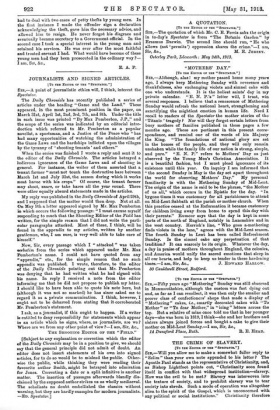"MOTHERS' DAY."
[To THE EDITOR 01 THE " SPECTATOR."] SIR,—Although, alas ! my mother passed home many years ago, I always keep Mothering Sunday with reverence and thankfulness, also exchanging violets and simnel cake with one who understands. It is the holiest saints' day in my private calendar. " E. N. P.'s " letter will, I trust, win several responses. I believe that a renascence of Mothering Sunday would refresh the national heart, strengthening and sanctifying the mightiest emotion in human life. Need I recall to readers of the Spectator the mother stories of the Titanic ' tragedy ? Nor will they forget certain letters from busy mothers of families published in these pages a few months ago. These are pertinent in this present corre- spondence, and remind one of the words of his Majesty the King. "The foundations of national glory are set in the homes of the people, and they will only remain unshaken while the family life of our nation is strong, simple, and pure." "E. N. P." refers to Mothers' Day as just observed by the Young Men's Christian Association. It is a beautiful fashion, but I must plead ignorance of its existence until this year. On inquiry I am informed that " the second Sunday in May is the day set apart throughout the world for observing Mothers' Day." My personal familiarity is with the Mothering Sunday of Mid-Lent. The origin of the name is said to be the phrase, "the Mother of us all," which occurs in the Epistle for the day. " In bygone times it was customary for all parishioners to attend on Mid-Lent Sabbath at the parish or mother church. When this practice ceased at the Reformation it became customary for children living away from home to spend this day with their parente." Rumour says that the day is kept in some parte of the north of England, notably in Lancashire and in the west country. Herrick's line, " Who goes a-mothering finds violets in the lane," agrees with the Mid-Lent season. The fourth Sunday in Lent has been called Refreshment Sunday. Is the simnel cake any perpetuation of that tradition? It can scarcely be its origin. Whatever the day, a day in praise of mothers throughout England, the colonies, and America would unify the sacred emotions that sleep in all our hearts, and help to keep us tender in these hardening times.—I am, Sir, &c., J. EDWARD HARLOW. 30 Cauldwell Street, Bedford.


















































 Previous page
Previous page